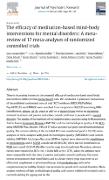| dc.contributor.author | Vancampfort, Davy | |
| dc.contributor.author | Stubbs, Brendon | |
| dc.contributor.author | Van Damme, Tine | |
| dc.contributor.author | Smith, Lee | |
| dc.contributor.author | Hallgren, Mats | |
| dc.contributor.author | Schuch, Felipe | |
| dc.contributor.author | Deenik, Jeroen | |
| dc.contributor.author | Rosenbaum, Simon | |
| dc.contributor.author | Ashdown-Franks, Garcia | |
| dc.contributor.author | Mugisha, James | |
| dc.contributor.author | Firth, Joseph | |
| dc.date.accessioned | 2022-01-24T10:40:21Z | |
| dc.date.available | 2022-01-24T10:40:21Z | |
| dc.date.issued | 2021-02 | |
| dc.identifier.citation | Vancampfort, Davy...et al (2021). The efficacy of meditation-based mind-body interventions for mental disorders: a meta-review of 17 meta-analyses of randomized controlled trials. Elsevier: Journal of Psychiatric Research. https://doi.org/10.1016/j.jpsychires.2020.12.048. | en_US |
| dc.identifier.uri | https://doi.org/10.1016/j.jpsychires.2020.12.048 | |
| dc.identifier.uri | https://kyuspace.kyu.ac.ug/xmlui/handle/20.500.12504/286 | |
| dc.description | 181-191 p. | en_US |
| dc.description.abstract | There is increasing interest in the potential efficacy of meditation-based mind-body interventions (MBIs) within mental health care. We conducted a systematic metareview of the published randomized control trial (RCT) evidence. MEDLINE/PubMed, PsycARTICLES and EMBASE were searched from inception to 06/2020 examining MBIs (mindfulness, qigong, tai chi, yoga) as add-on or monotherapy versus no treatment, minimal treatment and passive and active control conditions in people with a mental disorder. The quality of the methods of the included meta-analyses using A Measurement Tool to Assess Systematic Reviews (AMSTAR) and the methodological quality of the RCTs using AMSTAR-Plus. Sixteen (94%) of 17 meta-analyses had good overall methodological quality. The content validity of the included RCTs was considered good in 9 (53%) meta-analyses. In meta-analyses with good methodological quality (AMSTAR 8≤) and content validity (AMSTAR+ 4≤), large effect sizes (0.80 or higher) were observed for mindfulness in schizophrenia and in ADHD, a moderate (0.50 ≤ 0.80) effect size for mindfulness in PTSD and a small (0.20 < 0.50) effect size for yoga in schizophrenia No serious adverse events were reported (n RCTs = 43, n in the MBI arms = 1774), while the attrition rates were comparable with the rates in passive and active control conditions. Our meta-review demonstrates that mindfulness and to a lesser extent yoga may serve as an efficacious supplement to pharmacotherapy, and psychotherapy and can be complementary in healthy lifestyle interventions for people with mental disorders. Meta-analytic evidence of high methodological quality and content validity of included trials is currently lacking for qigong and tai chi. | en_US |
| dc.language.iso | en | en_US |
| dc.publisher | Elsevier: Journal of Psychiatric Research. | en_US |
| dc.relation.ispartofseries | Vol.134; | |
| dc.subject | Depression | en_US |
| dc.subject | Mindfulness | en_US |
| dc.subject | Qigong | en_US |
| dc.subject | Schizophrenia | en_US |
| dc.subject | Tai chi | en_US |
| dc.subject | Yoga | en_US |
| dc.subject | ADHD | en_US |
| dc.title | The efficacy of meditation-based mind-body interventions for mental disorders: a meta-review of 17 meta-analyses of randomized controlled trials | en_US |
| dc.type | Article | en_US |

